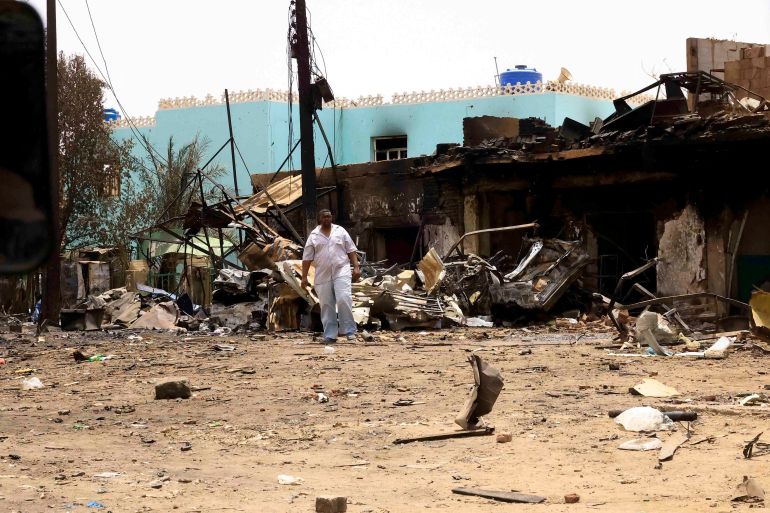Sudan army sends envoys for truce talks as fighting rages
Sudanese army sends delegation to Saudi Arabia for talks on humanitarian situation in the capital, Khartoum.

Sudan’s army has sent a delegation to the Saudi city of Jeddah for ceasefire talks as part of a joint Saudi and US initiative, the army said in a statement.
The delegation left for Jeddah on Friday evening after both the army and the rival paramilitary Rapid Support Forces (RSF) said they will only discuss humanitarian ceasefires and not negotiations on ending the conflict in Sudan.
Keep reading
list of 3 itemsKhartoum fighting continues despite new ceasefire in Sudan
Photos: Crowds of those seeking rescue swell at Sudan’s seaport
The army delegation will discuss “details of the truce in the process of being extended” with its paramilitary foes, the Sudanese army said.
The joint initiative aims at “reducing the levels of tension” in Sudan, a statement by the Saudi foreign ministry said on Friday.
The RSF would also send a delegation for the talks, the Associated Press news agency reported, citing a paramilitary official.
Al Jazeera’s Hiba Morgan, reporting from Khartoum, said sources in the Sudanese army have confirmed that a delegation left for Jeddah, and that it included three army officers – among them a general – as well as an ambassador.
“The purpose of these talks … is to focus on the humanitarian conditions here in the capital … and to open humanitarian corridors for those who are in need of assistance,” Morgan said.
Air raids and gunfire continued to rock Sudan’s capital on Friday, showing no signs of abating despite attempts at a lasting ceasefire.
Regular army chief Abdel Fattah al-Burhan had given his backing to a weeklong ceasefire brokered by South Sudan on Wednesday, but early on Friday, the paramilitary Rapid Support Forces (RSF) said they were extending by three days a previous truce brokered under US-Saudi mediation.
Multiple truces have been agreed to since the fighting between the rival security forces erupted on April 15, but none has been respected.
‘It must end’
Hundreds have died in nearly three weeks of fighting between forces of Sudan’s de facto leader al-Burhan, and his deputy-turned-rival Mohamed Hamdan Daglo, who commands the RSF.
Battles persisted a day after US President Joe Biden threatened sanctions against those responsible for “threatening the peace, security, and stability of Sudan” and “undermining Sudan’s democratic transition”.
The North African country had already suffered under decades of sanctions during the rule of longtime president Omar al-Bashir, who was removed in a palace coup in 2019 following mass protests on the streets.
“The violence taking place in Sudan is a tragedy – and it is a betrayal of the Sudanese people’s clear demand for civilian government and a transition to democracy. It must end,” Biden said.
Witnesses reported continued air raids and explosions in various parts of Khartoum on Friday, including near the airport.
The conflict has killed about 700 people so far, most of them in Khartoum and the western Darfur region, according to the Armed Conflict Location and Event Data Project.
The UN Human Rights Council said it would hold a special session on the situation in Sudan on May 11.
The gathering “to address the human rights impact of the ongoing conflict” will take place in Geneva following a request submitted Friday by the United Kingdom, Germany, Norway and the United States, which 52 countries have so far supported, the council said.
The UN children’s agency, UNICEF, warned on Friday that “the situation in Sudan has become fatal for a frighteningly large number of children”.
Aid workers have also struggled to get much-needed supplies to the areas hit by violence.
According to the International Medical Corps, at least 18 aid workers have been killed amid the fierce urban fighting.
US Director of National Intelligence Avril Haines said on Thursday that Washington expected the conflict to continue for a long time.
The fighting was “likely to be protracted as both sides believe that they can win militarily, and have few incentives to come to the negotiating table”, she told a Senate hearing.
“Both sides are seeking external sources of support, which, if successful, is likely to intensify the conflict and create a greater potential for spillover challenges in the region.”
A spokesman for the UN secretary-general on Friday warned the conflict could cause hunger and malnutrition for 19 million people in the coming months.
The World Food Programme “projects that the number of acutely food insecure people in Sudan will increase by between two and 2.5 million people. That raises the number to a total of 19 million people in the next three to six months if the current conflict continues,” Farhan Haq, deputy spokesman for Antonio Guterres, said.
Nearly 450,000 civilians have already fled their homes since the fighting began, the International Organization for Migration said, including more than 115,000 who have sought refuge in neighbouring countries.